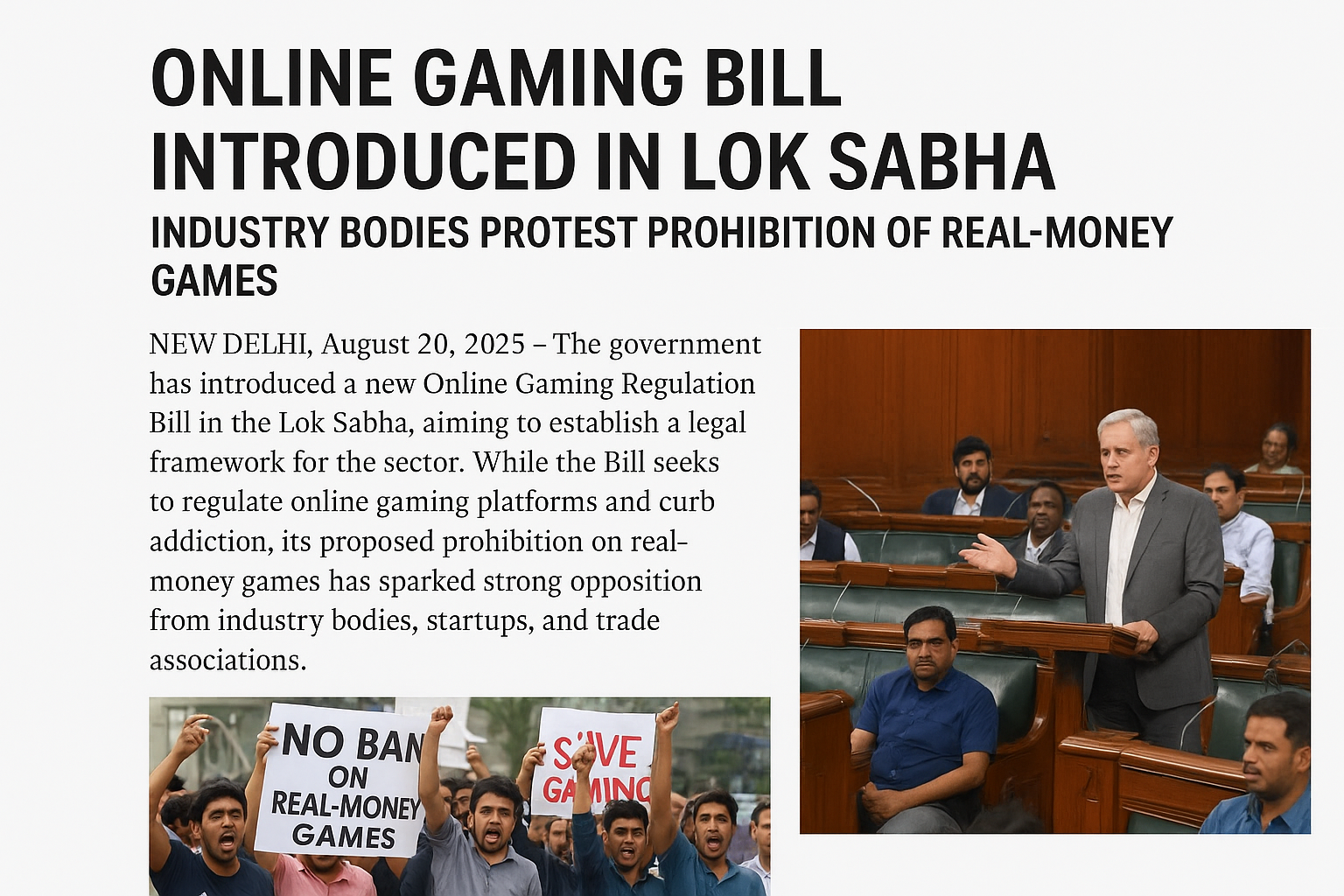New Delhi, August 20, 2025 – The government has introduced a new Online Gaming Bill in the Lok Sabha, aiming to establish a legal framework for the sector. While the Bill seeks to regulate online gaming platforms and curb addiction, its proposed prohibition on real-money games has sparked strong opposition from industry bodies, startups, and trade associations.
Key Provisions of the Online Gaming Bill
The Online Gaming Regulation Bill, tabled by the Ministry of Electronics and Information Technology (MeitY), lays down a set of rules for licensing and monitoring online gaming operators. According to the draft provisions:
- Ban on real-money games involving wagering, betting, or staking.
- Establishment of a Central Gaming Authority to oversee compliance.
- Strict age-verification norms and mandatory KYC for players.
- Limits on playing hours to reduce gaming addiction among minors.
- Penalties for violators, including fines up to ₹50 lakh and cancellation of licenses.
The government defended the Bill as a “necessary step to protect young players and curb financial losses caused by gambling-like games.” Officials also highlighted growing concerns about mental health issues, financial exploitation, and illegal betting syndicates operating through online platforms.
Industry Outrage: “A Blow to Innovation and Employment”
The announcement has triggered sharp protests from industry bodies such as the All India Gaming Federation (AIGF), E-Gaming Federation (EGF), and several startup associations.
Roland Landers, CEO of AIGF, said:
“This Bill threatens the very survival of India’s gaming industry. By prohibiting real-money skill-based games like poker and rummy, the government risks wiping out a sector that has created thousands of jobs and attracted global investment.”
Industry groups argue that the Bill fails to differentiate between games of skill and games of chance, despite several Supreme Court judgments recognizing skill-based gaming as a legitimate business activity.
According to EGF estimates, India’s online gaming industry is currently valued at ₹25,000 crore and expected to touch ₹50,000 crore by 2028, with real-money skill games accounting for a significant share.
Employment and Startups at Risk
Entrepreneurs warn that the ban could severely impact the startup ecosystem, which has seen heavy investor interest in gaming platforms over the past five years. Nearly 500 gaming startups operate in India, employing over 75,000 professionals directly and indirectly.
“India has the potential to become a global gaming hub, but blanket prohibitions will push innovation underground or force companies to relocate overseas,” said Anuj Gupta, founder of a popular fantasy sports platform.
Player Concerns
Gamers too have expressed disappointment, especially those engaged in competitive esports and fantasy leagues. Many argue that these platforms offer legitimate skill-based contests and should not be equated with gambling.
“I earn a decent side income from playing online rummy tournaments. If the Bill becomes law, it will take away both my passion and earnings,” said Rajesh Mehta, a player from Bengaluru.
Legal and Constitutional Debate
Several legal experts believe the Bill could face challenges in courts. They argue that:
- The Supreme Court and multiple High Courts have upheld that games of skill are not gambling.
- A nationwide prohibition may encroach upon the states’ power to regulate betting and gambling under the Constitution.
- The move could be seen as excessive regulation, affecting the right to trade and business under Article 19(1)(g).
Government’s Stand
Despite protests, government representatives maintain that the focus is on consumer safety. A senior official said,
“Our intention is not to kill the industry but to ensure responsible gaming. We are open to consultations, but public health and financial safety remain top priorities.”
What Lies Ahead
The Bill will now be referred to a parliamentary standing committee for review. Industry bodies are expected to submit detailed representations, urging the government to:
- Differentiate between skill-based games and gambling.
- Introduce regulation instead of prohibition.
- Encourage self-regulatory mechanisms with industry participation.
For now, uncertainty looms large over India’s booming online gaming industry. Stakeholders warn that the outcome of this legislation could shape the future of digital entertainment, investment, and innovation in India.


